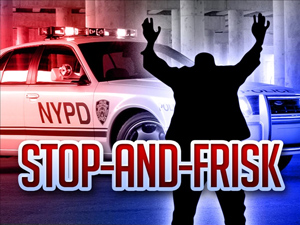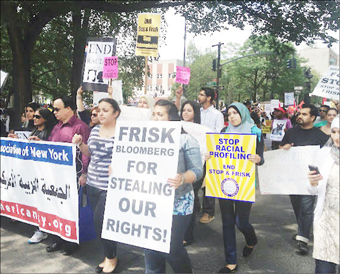Stop and frisk unconstitutional, but the fight isn't quite over yet
By Saeed Shabazz -Staff Writer- | Last updated: Aug 22, 2013 - 11:50:37 AMWhat's your opinion on this article?

|
Her decision on Aug. 12 also includes a call for a court-assigned independent monitor. City officials responded quickly with vows to appeal the ruling.
The federal judge’s decision followed a 10-week class action lawsuit trial, Floyd v. City of New York, brought by the Center for Constitutional Rights. The Floyd case was filed in 2008.
“Being stopped is frustrating, like the first time I was stopped it was in front of my house,” said David Floyd, a community activist who advocates for the rights of those confronted by the NYPD.
Mr. Floyd, appearing on VOXUNION.com, an internet television program with political activist Rosa Clemente said he was led to join the lawsuit because “during and after the police stop, you ask yourself, who are you going to turn to” for justice.
In concluding that the city of New York is liable for a pattern of stops and frisks in violation of the fourth amendment, Judge Scheindlin explained: “(The City has) received both actual and constructive notice since at least 1999 of widespread Fourth Amendment violations occurring as a result of the NYPD’s stop and frisk practices. Despite this notice, they deliberately maintained and even escalated policies and practices.”
“The NYPD is finally being held to account for its longstanding illegal and discriminatory policing practices,” center senior staff attorney Darius Charney said.
The center said that in 2011, the NYPD reported 685,724 stops—a 600 percent increase since Police Commissioner Raymond Kelly began his tenure in 2002. Eighty-four percent of the people stopped were Black and Latino, and 88 percent of those stopped were neither arrested or received summonses.
“Despite the stated purpose of the policy, weapons and contraband were recovered less than 2 percent of the time,” said the center.
“Whole communities have been held hostage by the NYPD stop and frisk practice,” Student Minister Abdul Hafeez Muhammad of Muhammad Mosque No. 7 in Harlem stated. He told The Final Call one of the most often heard complaints from young Black men in Brooklyn was police won’t allow them to stand where they live.
The Fruit of Islam from Nation of Islam mosques in Brooklyn and Harlem have been in the streets with weekly efforts aimed at curbing violence in the Black community.
Mayor Michael Bloomberg called the decision “very dangerous,” vowing an appeal. Some say the legal fight will outlast Mr. Bloomberg’s final days in office, since his term ends in January 2014.
The three-term mayor defended stop and frisk, citing a reduction in murders since 2002. Advocates like the Police Reform Organizing Project at the Urban Justice Center countered the mayor’s argument: The “drop in murders from 2002 to 2012 was only 12 percent, from 587 to 536 annually; same period murders declined by 43 percent in Washington, D.C. and 50 percent in Los Angeles, cities with less aggressive stop and frisk policies.”

Photo:courtesy of arabamericanny.org
|
Judge Scheindlin was also very clear about the problems with the policy. “This case is not about the effectiveness of stop and frisk in deterring or combating crime. The court’s mandate is solely to judge the constitutionality of police behavior, not its effectiveness as a law enforcement tool,” she said.
The judge noted in her decision that NYPD’s practice relied on “indirect” racial profiling by targeting Black and Latino residents, who would not have been stopped if they were White. Judge Scheindlin said stop and frisk violated the 14th amendment’s equal protection clause.
The ruling said Commissioner Kelly’s statement that NYPD’s stop and frisks of young Blacks and Latinos in order to instill fear of being stopped and other explicit references to race offer a sufficient basis for “inferring discriminatory intent.”
“At the end of the day, what is being expressed by law enforcement is that young Blacks and Latinos should stay in their homes and keep their mouths shut,” Mr. Floyd said.
Stop and frisk raises a serious question of “control,” according to Carl Dix, an anti-police violence activist and spokesman for the Communist Party, USA. “They remember the 1960s, when Black and Latino youth stood up for change, therefore the establishment must suppress the young voices through mass incarceration and stop and frisk and to burnish the image in society that they are all criminals,” he said.
Ron Hampton, president of Blacks in Law Enforcement in America, expects the mayor and police commissioner to appeal to White fears during the appeal process. “They will create a groundswell supporting the continuance of the practice, with the perception that White people who go jogging won’t be safe,” Mr. Hampton said.
This will buy time for NYPD enforcement strategists to come up with ways to continue doing what they are doing, but with a different look, he said.
The front page of one of NYC’s daily newspapers on Aug. 13 read: “Murder She Wrote: Fear over returning to bloody bad old days,” referring to the judge’s ruling.
Brooklyn Councilman Charles Barron called the ruling a step in the right direction. “This court order by a judge will not stop the police terror and brutality against our people,” the Democratic Councilman Barron said. The ruling doesn’t end stop and frisk, it merely says don’t use racial profiling to do it, Councilman Barron stressed.
“We need to come together to protect our communities,” the councilman said. “Let unemployed Black men and women get paid to patrol our communities, because we know the cops don’t have fundamental respect for us as human beings.”
Related news:
Atlanta area man harrased, arrested during BMW test drive (WSBTV, 05-28-2013)
Seething anger in New York over police 'immunity' in shootings (FCN, 02-20-2012)
Complaints against New York City police rising (FCN, 07-03-2009)
New Yorkers vow to fight for justice for father killed in hail of 50 bullets (FCN, 05-06-2008)
Mistrial declared for former cop shot 28 times by police (FCN, 06-01-2007)
New York police chief racially profiled? (FCN, 06-04-2008)
INSIDE STORIES AND REVIEWS
-
-
About Harriett ... and the Negro Hollywood Road Show
By Rabiah Muhammad, Guest Columnist » Full Story -
Skepticism greets Jay-Z, NFL talk of inspiring change
By Bryan 18X Crawford and Richard B. Muhammad The Final Call Newspaper @TheFinalCall » Full Story -
The painful problem of Black girls and suicide
By Charlene Muhammad -National Correspondent- » Full Story -
Exploitation of Innocence - Report: Perceptions, policies hurting Black girls
By Charlene Muhammad -National Correspondent- » Full Story -
Big Ballin: Big ideas fuel a father’s Big Baller Brand and brash business sense
By Bryan Crawford -Contributing Writer- » Full Story






 Click Here Stay Connected!
Click Here Stay Connected!








